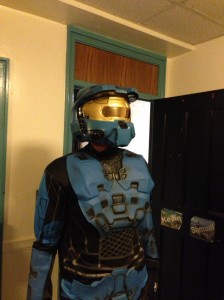In my thoughts on the movement work, I want to talk more at the idea of “eyes of the head/chest/guts” idea. I remember a rather loud, obvious reaction that I had to a particular moment when transitioning from one body area to another created an honest truthful sense of discovery and a clear thought process within a monologue, something fascinating to watch onstage. Thinking (or alternately “leading”) with various parts of the body can communicate more than trying to emulate something internal could. Ideally, we want both, but what really interests me is starting with this stuff, the body work, then feeding into emotions.
I had a great experience with Cock two days ago. As tempted as I am to just leave that sentence there, unelaborated upon, I will explain myself. There is a sex scene within the play that had always been giving me some difficulty, mostly because there is no touching within the scene. Thus, I had to provide my own imagery and motivations, and my connection with my scene partner had to be so strong as to be nearly tangible. Two nights ago, I made choices to connect with my scene partner in terms of eye contact and proximity, and how I chose to activate my spine/neck/head. At the end of the scene, I was covered in sweat, shaking, and I had to pull myself back together. I felt like I had just had sex for the first time again. I had this visceral experience that stemmed from what I was doing physically and the way I connected to the other party in the scene, and it fed into my personal imagery, which in turn put me in exactly the right place for the scene. The same happened in another scene where I needed to take control, but again in a sexual situation. So I moved my neck in opposition to my hips, and suddenly certain elements fell into place, at least internally.
So, all that is intended to say that the movement work and its focus on body awareness has already clarified a number of things in my mind.
In regards to table work, it’s an interesting process, because I’m the type of person who will get caught on and obsess over some detail that I can’t really play as an actor. So as a result I’m a little wary of long periods of table work. And it’s not that I don’t see the value in dramaturgy, it’s just that I worry about getting stuck in my own head as a result of a month of study. The movement work has kept me in touch with my body, so as soon as I stopped worrying about losing that connection, I was able to open up and start learning. Now, as we’re discussing backstories & cetera, I am constantly looking at how these details (and the studying that we are doing) might translate into playable, meaningful objectives or design choices or something else entirely. I’m learning how the table connects to the stage, and I’m feeling really good about that process.
Something interesting that keeps occurring to me as we do text analysis is the idea of unreliable narration. In Vanya, a lot of information comes from monologues, sometimes to no one in particular. So how much of that can we really trust, especially when everyone either hates or loves everyone in the house? This is the same sort of thing that happens in Cock, and it only became clear to me that perhaps not everything I said was really factually true when one of my fellow actors completely revised my timeline of events in a very credible way.
So to sum up, things are making sense now, and my toolbox just gets more and more full.
PLW
PS — I love that the toolbar at the top of the page says “Howdy, Phil Watson.” It’s like it knows where I’m from or something.



